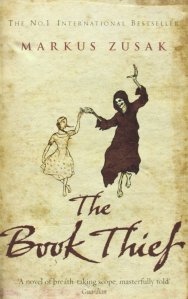It’s just a small story really, about, among other things, a girl, some words, an accordionist, some fanatical Germans, a Jewish fist-fighter, and quite a lot of thievery.
Set during World War II in Germany, Markus Zusak’s groundbreaking new novel is the story of Liesel Meminger, a foster girl living outside of Munich. Liesel scratches out a meagre existence for herself by stealing when she encounters something she can’t resist: books. With the help of her accordion-playing foster father, she learns to read and shares her stolen books with her neighbours during bombing raids – as well as with the Jewish man hidden in her basement before he is marched to Dachau.
This is an unforgettable story about the ability of books to feed the soul.
I was so excited about this book. I’ve heard great things about it, and I love historical fiction. But this was a huge let down.
Okay, firstly the narrator. It’s Death, and that’s kinda cool. But does he have to keep interjecting? This is a story about Liesel, not him! He kept mentioning how it was written in her book, and I would have much rather read it the way she wrote it. I would have forgiven him for interjecting, but he never said anything interesting. Mostly it was just spoilers. He’d talk about people and go “This was the last time Liesel would see them alive”. “This is the last time so-and-so would ever laugh”. “I carried his soul away.” Lucky for me I’d watched the movie first, so I knew what was going to happen, but if I hadn’t it would have made me really mad! I want to find that out on my own thanks!
Then there was the style of writing. Fun fact: not everything needs to be compared to something else. I’m sure nothing was described without some metaphor or simile. At first I liked it, it made everything look nicer in my head. But then it just got unrealistic. Liesel is 11, no one that age describes things like that! Not many people any age describe things like that! Then, once it’s been described, stop. Don’t repeat the metaphor a thousand times through the book. Don’t use the simile as the character’s defining feature. It ruins the effect.
However, I’m not saying this book was terrible. Max, despite being stereotypical, was kinda cool. I could picture him and Liesel in the basement, with him writing and drawing, and that was nice. And Papa. Oh, Papa. I wanted him to play the accordion for me. I wanted him to look after me when I had nightmares. Liesel was so lucky to have him, he was the perfect father for her.
And the end. I hardly ever cry in books. There was The Fault in Our Stars, and that made me weep. But after that, there’s been nothing. Until this. I felt like a little girl, curled up in my chair sobbing my little heart out. So I suppose the book must have been written better then it seemed, since I fell in love with those characters who died. Or Liesel’s reaction was just really believable, I’m not quite sure.
Overall, I’ll give it three stars. 2 lost for terrible writing and an annoying narrator, but 3 for that ending and Papa.

Well, I disagree, but your criticisms mostly make sense. And at least we share a love for Hans Hubermann. XD
I will point out though that the metaphors come purely from Death, not Liesel. The idea I think is to show the unusual way Death views ordinary things and typical conversations. It gets things “first the colors, then the humans” so naturally it focuses on emotions it is capable of sensing and impressions of how things are, and doesn’t tell stories in a conventional way.
Thank you for commenting on my blog, and my only real objection is the summary you quoted at the top is spoileriffic.
LikeLike
To be honest, I’ve lost interest in the book, but I did write a new review of it recently, and I honestly found myself being very critical towards it. I don’t know if you would find it interesting or not, but know that I can understand your perspective.
I was particularly harsh at the end, towards the chapter “The Losers”:
https://kirksbooks.wordpress.com/2017/05/26/i-read-the-book-thief-part-five-chapters-one-four/
LikeLike